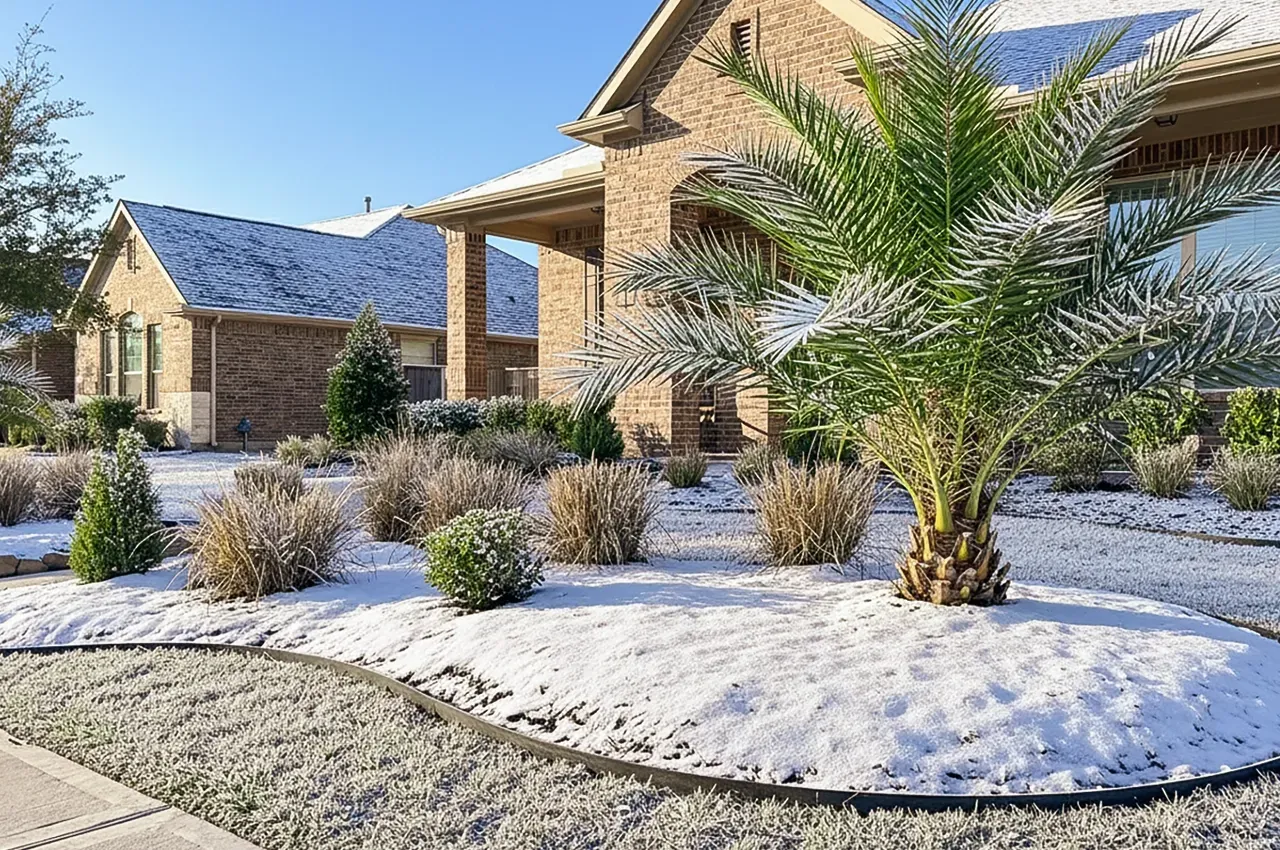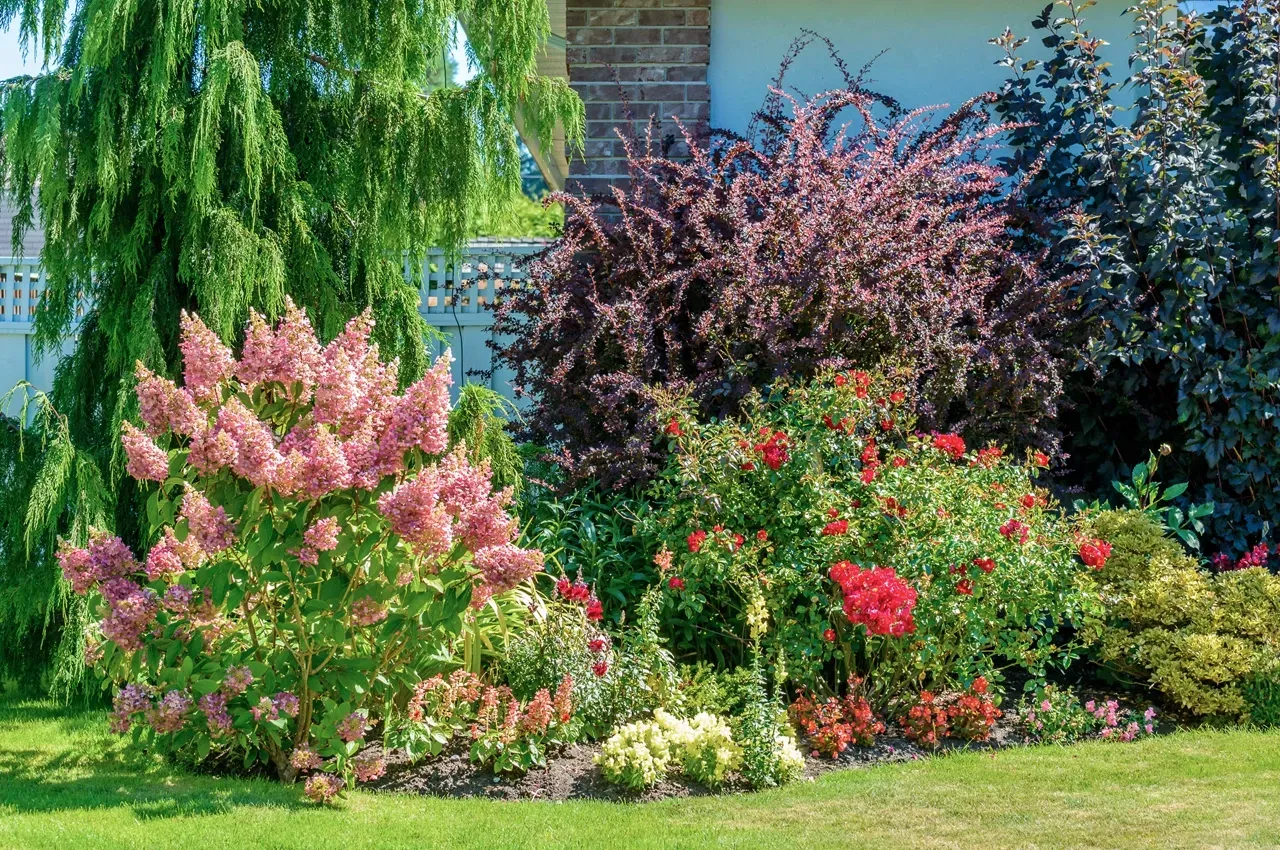How to Grow and Care for Yucca Plants
How to Grow and Care for Yucca Plants
Bold, sculptural, and incredibly resilient, yucca plants are the perfect choice for Texas homeowners to add to their landscapes. Yuccas thrive in hot climates like Houston and bring a clean, modern look to any yard.
Whether you’re designing a poolside patio or simply want a low-maintenance statement plant, this guide from Rosehill Palms will walk you through everything you need to know to grow and care for yucca plants successfully.
What are Yucca plants?
Yuccas are evergreen, perennial plants native to arid regions of North and Central America. Known for their architectural form and ability to withstand harsh conditions, yuccas are part of the Agave family and come in a variety of shapes and sizes—from compact varieties like Yucca gloriosa to giants like Yucca Rostrata.
Depending on the type, yuccas may form a rosette at ground level or develop a tall trunk, resembling a small tree. Most varieties produce tall, showy flower spikes in spring or summer, typically with white, bell-shaped blooms that attract pollinators.
They’re praised for their drought-tolerance, minimal maintenance needs, and suitability for modern landscape designs.
Choosing the Right Variety
There are many different types of yucca with distinguishing features and uses. Here are a couple of the most popular:
Yucca Rostrata
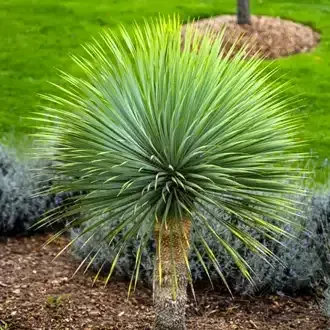
A stunning, trunk-forming variety with fine blue-green leaves and a symmetrical, spherical shape. Ideal for modern or desert-inspired gardens.
Yucca Gloriosa
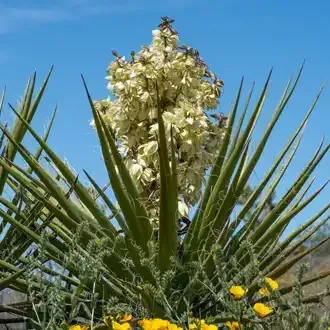
Also known as Spanish Dagger, this compact, hardy variety has sword-shaped green or variegated leaves and tall flower spikes.
Yucca Filamentosa
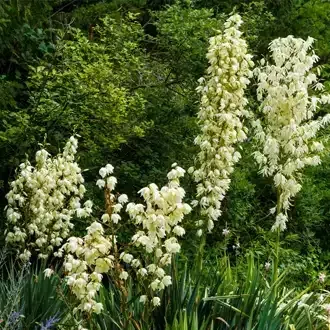
Often used in mass plantings or borders, this variety features curly white threads along its leaves and a clumping growth habit.
Yucca Aloifolia
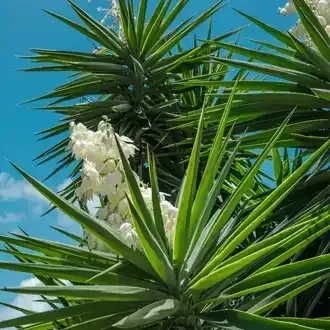
Known as the “sharpest” yucca, this variety is bold and dramatic, but best planted away from high-traffic areas.
How to Choose a Location for Your Yucca Plants
Yuccas love their sun and personal space. Aim for a location with full sun, at least 6-8 hours of sunlight per day, and good soil drainage. Sandy or gravelly soil is ideal to prevent root rot. The amount of space depends on the variety you pick, but some can grow up to 15ft tall and 6ft wide, so make sure you give it plenty of room to grow.
Yuccas work great as part of patio and pool landscaping as a statement plant or focal point.
How to Plant Yucca Plants Correctly
- Dig a hole twice as wide as the root ball and slightly shallower than the root depth.
- Mix in gravel or sand if your soil needs better drainage.
Place the plant so the base of the stem is slightly above ground level. - Backfill, gently tamp the soil, and water thoroughly.
Tip: Don’t plant yuccas too deeply—this can lead to rot, especially in wetter climates.
Yucca Plant Care: Watering and Feeding
Once established, yuccas require very little maintenance. Yuccas are light feeders. You can apply a
balanced slow-release fertilizer (like 10-10-10) in spring to encourage healthy growth and flowering. Avoid overfeeding, especially with high-nitrogen formulas, as this can cause weak, floppy growth.
How Often Should I Water Yucca Plants?
Yuccas are drought-tolerant and prefer to dry out between waterings. During their first year, water deeply every 7–10 days until roots are well established. After that, you may only need to water once every 2–3 weeks during hot, dry periods. Overwatering is the most common mistake—root rot can quickly kill a yucca in poorly drained soil.
Pruning and Shaping Yucca Plants
Yuccas don’t require much pruning, but here are some tips for maintaining a clean look:
- Remove dead or damaged leaves near the base with clean pruners.
- Cut back spent flower stalks after blooming to keep the plant tidy.
- For trunk-forming varieties, old lower leaves can be trimmed to reveal the trunk and give a tree-like shape.
Wear gloves and long sleeves when handling yuccas, as many have sharp leaf tips or edges.
Common Yucca Pests and Problems
Yuccas are prized for their durability, but they are not immune to issues. The good news is that many of their most common problems are easily avoidable.
Pests
Scale Insects
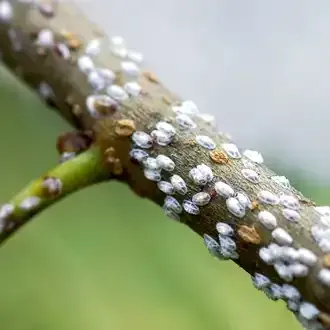
Small, dome-shaped bugs that feed on plant sap and create sticky mold and yellow leaves. They can be prevented with neem oil or insecticidal soap.
Mealybugs
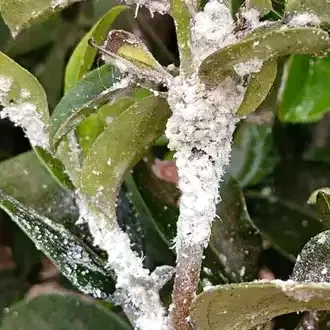
White, cottony insects that cluster in leaf joints. They can be removed with rubbing alcohol or neem oil for larger infestations.
Aphids
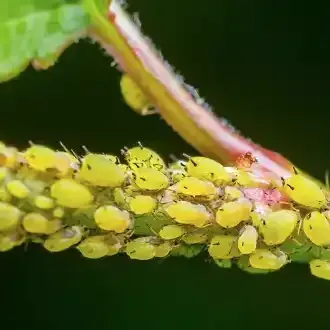
Small insects that gather on new growth and flower stalks. They often stunt new growth. Introduce ladybugs to control them naturally or treat with insecticidal soap.
Disease
- Root rot: Overwatering or poor drainage can cause the roots to rot and become mushy.
- Crown rot: Poor airflow in the leaves or watering directly into the crown can cause the center of the plant to rot.
- Leaf spot: Similar to crown rot, poor airflow or watering the crown instead of the soil can cause a fungal infection in the leaves.
All of these diseases are easily preventable by ensuring appropriate watering and space for air circulation. If these diseases being, they can be treated in the early stages with fungicide.
Winter Care and Cold Protection
Most yucca varieties sold at Rosehill Palms are hardy in Houston’s climate (zones 8–10) and can withstand normal winter conditions with no problem. They require no winter protection unless extreme cold is expected. In unusually cold snaps, we recommend:
- Apply a layer of mulch around the base
- Cover smaller plants with frost cloth
- Avoid watering just before a freeze
Container-grown yuccas should be moved to a sheltered spot if temperatures drop below 25°F. Containers provide less insulation to the roots than in-ground planting and are more susceptible to temperature changes and extreme temperatures.
Conclusion
Yucca plants are more than just tough—they’re stunning. With their sculptural forms, sun-loving nature, and minimal care requirements, they’re the perfect choice for Houston homeowners looking to create modern, sustainable, and visually striking landscapes.
At
Rosehill Palms, we carry a wide variety of locally grown yuccas that are well-adapted to the Texas climate. Visit our nursery today or contact us. Our team can help you choose the right plants, give you expert advice, and help bring your outdoor vision to life.
Palms Winter Protection Package
We offer seasonal Palms Care Packages to ensure that your investment is protected during Winter and ready to glow in Spring.
Recent Posts
Proud member of the
Texas Nursery & Landscape Association
Please feel free to contact us via the form below. We will give you an answer as soon as possible!
Contact Rosehill Palms
We will get back to you as soon as possible.
Please try again later.
Rosehill Palms | Developed by WSI Urdaneta Group | All Rights Reserved 2026

